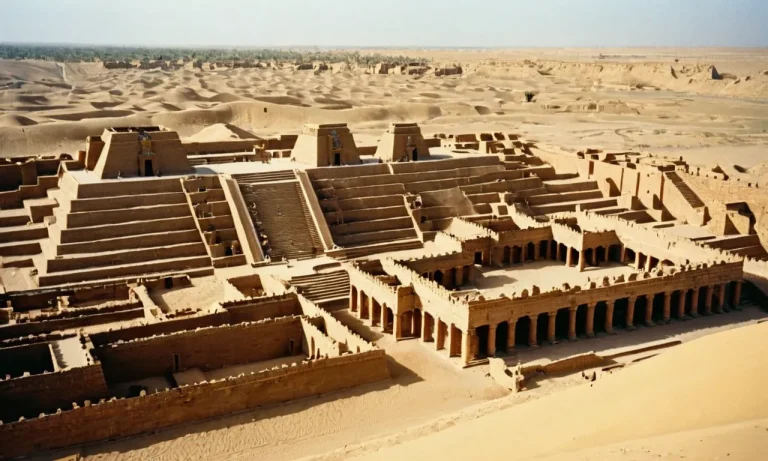Is Antigua In The Hurricane Belt?
The Caribbean islands are known for their stunning beaches and tropical weather. However, that weather also brings the threat of hurricanes. If you’re planning a vacation to the paradise island of Antigua, you may be wondering – is Antigua in the hurricane belt?
If you’re short on time, here’s a quick answer: Yes, Antigua is considered to be in the Atlantic hurricane belt. Its location in the Leeward Islands of the Caribbean means it is vulnerable to tropical storms and hurricanes, especially during the Atlantic hurricane season from June to November.
In this detailed article, we will look at Antigua’s unique location, hurricane history, the effects of recent storms, hurricane preparedness in Antigua, and what risks hurricanes pose to tourists. With hurricane season approaching, understanding Antigua’s relationship with these tropical storms can help you plan your vacation and know what to expect.
Antigua’s Geographic Location Puts it at Risk
Located in the beautiful Caribbean Sea, Antigua is indeed in the hurricane belt. Its geographic position makes it susceptible to the powerful storms that form in the region. Let’s take a closer look at why Antigua is at risk.
Part of the Leeward Islands in Hurricane Alley
Antigua is part of the Leeward Islands, a group of islands in the northeastern Caribbean. This region is commonly referred to as the “Hurricane Alley” due to its location in the path of tropical storms and hurricanes.
The warm waters of the Caribbean Sea combined with the trade winds create the ideal conditions for the formation and intensification of these storms.
Being situated in the heart of Hurricane Alley means that Antigua is more likely to experience the effects of tropical storms and hurricanes compared to other areas in the Caribbean. While the island has a relatively low occurrence of direct hits from major hurricanes, it still experiences the impact of these storms, including heavy rainfall, strong winds, and storm surges.
Peak of Hurricane Season in August-October
Hurricane season in the Atlantic runs from June 1st to November 30th, with the peak occurring between August and October. During this period, the conditions for hurricane formation are most favorable, and the likelihood of a storm affecting Antigua increases.
It is important for residents and visitors to be aware of the potential risks and to take necessary precautions during the hurricane season. The local government and meteorological authorities closely monitor weather patterns and issue warnings and advisories to ensure the safety of the population.
According to the National Hurricane Center (NHC), it’s essential to have a well-prepared emergency plan, including knowing the evacuation routes and having supplies such as food, water, and medication readily available. Staying informed about weather updates and following the instructions of local authorities is crucial in ensuring personal safety during a hurricane or tropical storm.
Despite the risks associated with its geographic location, Antigua remains a popular tourist destination. The island’s stunning beaches, vibrant culture, and warm hospitality continue to attract visitors from around the world.
With proper planning and awareness, it is possible to enjoy all that Antigua has to offer while staying safe during hurricane season.
History of Hurricanes Impacting Antigua
Hurricanes Irma and Maria in 2017
In 2017, Antigua and its neighboring islands were severely hit by Hurricanes Irma and Maria, two of the most powerful hurricanes ever recorded in the Atlantic Ocean. These hurricanes caused significant damage to the island, including destruction of homes, infrastructure, and natural habitats.
The impact of these hurricanes was felt not only in Antigua but also in other Caribbean islands, such as Barbuda and Dominica.
Hurricane Irma, a Category 5 storm, made landfall in Antigua on September 6, 2017, with winds reaching up to 185 miles per hour. The island experienced widespread power outages, flooding, and destruction of buildings.
The aftermath of Hurricane Irma was devastating, with many residents left homeless and in need of assistance.
Just a few weeks later, Hurricane Maria, also a Category 5 storm, passed by Antigua and caused further destruction. Although the eye of the hurricane did not directly hit the island, the outer bands of the storm brought heavy rain and strong winds to Antigua, exacerbating the damage caused by Hurricane Irma.
The impact of Hurricanes Irma and Maria in 2017 serves as a reminder of the vulnerability of Antigua to hurricanes and the importance of preparedness and resilience in the face of such natural disasters.
Other Notable Hurricanes Over the Years
Antigua, being located in the hurricane belt of the Atlantic Ocean, has a long history of being affected by hurricanes. Over the years, the island has experienced several notable hurricanes that have left a lasting impact on its infrastructure and communities.
One such hurricane was Hurricane Luis, which struck Antigua in 1995. This Category 4 storm caused extensive damage to the island, including destruction of buildings, power outages, and loss of vegetation.
The recovery efforts following Hurricane Luis were significant and took several years to fully rebuild and restore the island.
Another notable hurricane in Antigua’s history is Hurricane Bertha, which made landfall in 1996. This Category 1 storm caused flooding and damage to homes and infrastructure. Although not as destructive as some of the other hurricanes, Hurricane Bertha served as a reminder of the constant threat that hurricanes pose to the island.
Throughout its history, Antigua has faced numerous hurricanes, each with its own unique impact on the island and its residents. These hurricanes have shaped the resilience and preparedness of the Antiguan community, as they continually adapt and learn from each storm to better protect themselves and their island.
For more information about hurricanes in Antigua, you can visit the National Hurricane Center website.
Effects of Hurricanes on Antigua
Economic Impact on Tourism Industry
Antigua, like many other Caribbean islands, is located in the hurricane belt, which means it is susceptible to the devastating effects of hurricanes. The tourism industry, being one of the main sources of revenue for Antigua, is greatly affected when hurricanes strike.
The island’s beautiful beaches, crystal-clear waters, and warm climate attract tourists from all over the world. However, when a hurricane hits, it can cause significant damage to the infrastructure, resorts, and attractions, resulting in a decline in tourist arrivals.
The economic impact of hurricanes on the tourism industry in Antigua can be substantial. Tourists may cancel their trips or choose to visit other destinations that are not in the hurricane belt. This leads to a decrease in hotel bookings, restaurant visits, and other tourism-related activities.
The loss of revenue not only affects the tourism sector but also has a ripple effect on other industries, such as transportation, retail, and agriculture, which rely on tourism for their livelihood.
According to a study conducted by the Caribbean Tourism Organization (CTO), the average annual economic loss due to hurricanes in the Caribbean region is estimated to be around $741 million. This includes direct damages to infrastructure and property, as well as indirect losses from reduced tourism activity.
Antigua, being part of this region, bears its share of these economic losses.
Environmental Effects
In addition to the economic impact, hurricanes also have significant environmental effects on Antigua. These powerful storms can cause widespread destruction of natural habitats, including forests, wetlands, and coral reefs.
The strong winds and heavy rainfall associated with hurricanes can uproot trees, erode soil, and flood coastal areas.
The destruction of coral reefs, which are essential for marine life and serve as a major attraction for tourists, is a major concern. Coral reefs provide habitats for a wide range of marine species and protect the coastline from erosion.
When hurricanes pass through, they can break apart coral reefs, leading to long-term damage and loss of biodiversity.
The environmental impact of hurricanes can also extend to the water quality in Antigua. Heavy rainfall and storm surges can wash pollutants into the sea, leading to contamination of the marine ecosystem.
This can have detrimental effects on marine life and the overall health of the surrounding waters.
Efforts are being made to mitigate the environmental impact of hurricanes in Antigua. The government and various organizations are implementing measures to protect and restore natural habitats, such as reforestation projects and coral reef restoration initiatives.
These initiatives aim to preserve the island’s natural beauty and biodiversity, while also ensuring the sustainability of the tourism industry.
Hurricane Preparedness in Antigua
Antigua, located in the Caribbean, is indeed part of the Hurricane Belt. This means that it is susceptible to hurricanes during the Atlantic hurricane season, which typically runs from June to November.
However, despite the inherent risk, Antigua has taken significant steps to ensure the safety and preparedness of its residents and visitors in the face of these powerful storms.
Improved Building Codes and Infrastructure
One of the key aspects of hurricane preparedness in Antigua is the implementation of improved building codes and infrastructure. The government has recognized the importance of constructing buildings that can withstand the strong winds and heavy rainfall associated with hurricanes.
By enforcing stricter building codes and regulations, Antigua has greatly reduced the potential for structural damage and loss of life during these storms.
The construction of hurricane-resistant buildings involves using reinforced materials, such as concrete and steel, and implementing techniques that enhance the structural integrity of the buildings. These measures include reinforced roofs, impact-resistant windows, and secure foundations.
By investing in these improvements, Antigua has significantly reduced the vulnerability of its infrastructure to hurricane-related damage.
Communication of Storm Warnings and Safety Information
In order to ensure the safety of its residents and visitors, Antigua has established effective communication channels for storm warnings and safety information. The National Office of Disaster Services (NODS) plays a crucial role in disseminating timely and accurate information about approaching hurricanes.
This includes issuing weather bulletins, storm updates, and evacuation notices through various mediums, such as radio, television, and social media.
The NODS also works closely with meteorological agencies to closely monitor weather systems and provide real-time updates to the public. Additionally, they conduct public awareness campaigns to educate the community about hurricane preparedness and response measures.
By keeping the public well-informed and educated, Antigua has significantly enhanced its ability to respond effectively to hurricanes.
Availability of Shelters and Supplies
Antigua has made significant efforts to ensure the availability of shelters and essential supplies during hurricanes. The government has designated several hurricane shelters throughout the island, equipped with emergency generators, medical supplies, and provisions to accommodate residents in need of temporary refuge.
In addition to shelters, Antigua has established a robust supply chain to ensure the availability of essential items before, during, and after a hurricane. This includes stockpiling food, water, and medical supplies, as well as coordinating with local businesses and relief organizations to facilitate the distribution of these resources.
Furthermore, the government encourages individuals and families to be self-sufficient by creating their own emergency kits, including non-perishable food, water, flashlights, batteries, and first aid supplies.
These measures ensure that Antigua is well-prepared to provide for the needs of its residents during and after a hurricane.
Hurricane Risks for Tourists
Threat of Cancellations and Interruptions
Antigua, located in the Caribbean, does fall within the hurricane belt. This means that there is a risk of hurricanes affecting the island during the Atlantic hurricane season, which typically runs from June to November.
Tourists need to be aware of this potential risk when planning their trips to Antigua.
One of the main concerns for tourists during hurricane season is the threat of flight cancellations and interruptions. Airlines may cancel or reschedule flights due to severe weather conditions, leaving tourists stranded or having to change their travel plans.
It is important to stay updated with the latest weather forecasts and stay in touch with your airline or travel agent for any changes or disruptions to your travel itinerary.
Additionally, hotels and resorts may also be affected by hurricanes, leading to temporary closures or limited services. It is advisable to check with your accommodations about their hurricane preparedness plans and cancellation policies in case of any disruptions caused by a hurricane.
Personal Safety Concerns
Another aspect to consider when traveling to Antigua during hurricane season is personal safety. Hurricanes can bring strong winds, heavy rain, and storm surges, which can pose risks to tourists. It is important to follow any evacuation orders or advisories issued by local authorities and seek shelter in a safe location if necessary.
During a hurricane, it is advised to stay indoors, away from windows and doors, and to have a supply of necessary items such as food, water, flashlights, and batteries. It is also recommended to have a plan in place for communication with family and friends in case of any emergencies.
While Antigua has established hurricane preparedness measures in place, it is still crucial for tourists to take personal responsibility for their safety during severe weather events.
When to Consider Trip Insurance
Given the potential risks associated with hurricanes in Antigua, it may be wise to consider purchasing trip insurance. Trip insurance can provide coverage for trip cancellations, interruptions, and additional expenses incurred due to a hurricane.
When selecting trip insurance, it is important to carefully review the policy coverage, including any specific terms and conditions related to hurricanes. Some policies may only provide coverage if a hurricane directly impacts your travel destination or if specific criteria are met.
It is recommended to compare different insurance options and consult with a travel insurance professional to determine the best coverage for your needs and the level of risk you are comfortable with.
Conclusion
Hurricanes are an unfortunate environmental threat for the island paradise of Antigua. Located squarely within the Atlantic hurricane belt, Antigua has faced impacts from some of history’s most devastating storms.
By preparing with protective infrastructure, effective emergency planning, and proper precautions, Antigua works to mitigate hurricane damage and make the island as safe as possible. While the peak hurricane season brings added risks, with care and vigilance, tourists can still safely enjoy Antigua’s renowned beauty and hospitality – even during storm season.








